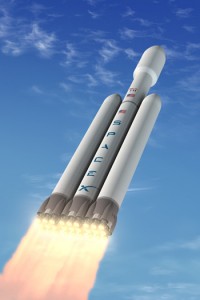 The U.S. Air Force, in cooperation with NASA and the National Reconnaissance Office, has announced their certification strategy to allow competition for rocket launch contracts. This is after a Letter of Intent was signed by the three groups last year, and a Memorandum of Understanding earlier this year. What it means is that another necessary step has been taken in allowing private companies to compete for the lucrative contracts.
The U.S. Air Force, in cooperation with NASA and the National Reconnaissance Office, has announced their certification strategy to allow competition for rocket launch contracts. This is after a Letter of Intent was signed by the three groups last year, and a Memorandum of Understanding earlier this year. What it means is that another necessary step has been taken in allowing private companies to compete for the lucrative contracts.
I think this is a good thing. Right now, the Air Force contracts all its launches with the United Launch Alliance, a union of Boeing and Lockheed Martin that started in 2006. These are the folks who make rockets like the very reliable Delta II, which has sent a large number of probes to destinations in the solar system, and the Atlas V, which will launch the Mars Science Lab to the Red Planet in November.
I wouldn’t necessarily say ULA has a monopoly, since in many ways they are the only game in town to launch such rockets (though others don’t hesitate to call it that). But SpaceX, a private company, has successfully launched its Falcon 9 rocket, capable of taking supplies and humans to orbit (though it’s not human-rated yet; it has to be certified to take people up, which should happen in the next couple of years). The future for SpaceX looks pretty good. This new announcement by the USAF/NRO/NASA means that companies like SpaceX have a chance to elbow their way into this billion-dollar opportunity.
And again, this is just one more step toward this open contract; it may be some time before any money exchanges hands. This situation is interesting; Elon Musk, head of SpaceX, has made it clear he is gunning for ULA; SpaceX filed an antitrust suit against the formation of ULA in 2005 (which ultimately was denied), and has made many announcements in the past that he can launch rockets cheaper and better than competitors. I think he may very well be right. ULA makes a huge amount of money in defense launches, and if Spac X can get a piece of that then things will get very interesting indeed.
I’m a big fan of competition, when the playing field is level. I’m not an expert in this area, but this sounds like a good direction for the government to go. If SpaceX – and a handful of other companies coming up now – can launch rockets reliably and less expensively, then that makes access to space easier for everybody. And that is something I’d very much like to see.
Again, I am no expert here. If you agree or disagree, or better yet have information about this, I’d be curious to see it; please leave it in the comments. This is a fairly complex situation, and I’d like to learn more.
Image credit: SpaceX